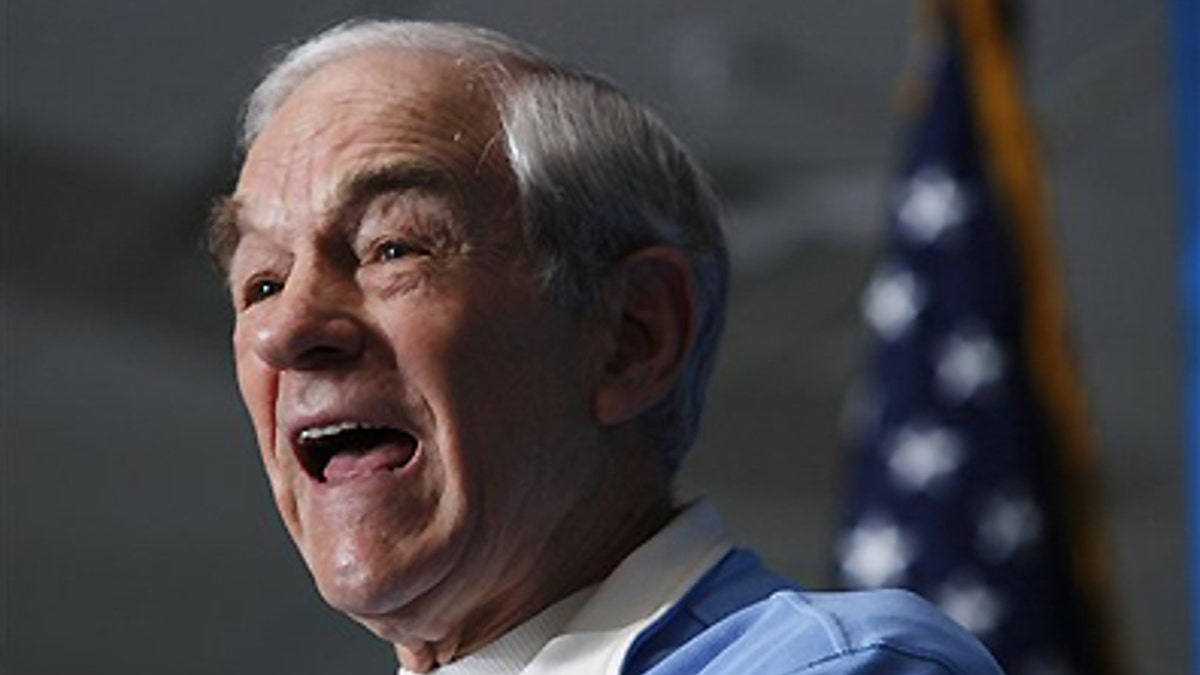
Jan. 28, 2012: Republican presidential candidate, Rep. Ron Paul, R-Texas, speaks during a campaign stop at the University of Southern Maine in Gorham, Maine. (AP Photo/Robert F. Bukaty)
The first primaries of 2012 are complete, but the fight over the proper role of government continues. The question before GOP primary voters is who best reflects their own answer to that question, and then, who is best suited to make that case to the American people?
A clear winner has yet to emerge, but there is little question about who has captured the loyalty of young Republican voters on this issue. Although finishing fourth overall, Ron Paul once again won the youth vote in South Carolina, winning 31% of ages 18-29, compared to Newt Gingrich who won 28%. Paul’s appeal, or more accurately, the appeal of Paul’s limited government message, is a key story to emerge from the Republican primaries.
There’s no mistaking the trend.
Mitt Romney won the New Hampshire primary, getting approximately 39% of the total vote. Ron Paul finished second with 23%, Jon Huntsman finished third with 17%, and Newt Gingrich and Rick Santorum each won about 9% of the vote.
Yet young voters would have picked a different winner. According to Fox News exit polls, in New Hampshire, Paul won nearly half (46%) of the votes of people ages 18-29, while Romney won second place with just 26%.
Paul also won the youth vote in Iowa. In the Hawkeye State almost half (48%) of the Republican caucus goers ages 18-29 supported Paul, compared to 23% for the otherwise victorious Santorum, and 14% for Romney.
What is so appealing about Paul to young voters? One answer is that Paul has been the most outspoken candidate defending the importance of free enterprise and the limited role of government. And he has had a consistent message for years.
Free enterprise has been on trial in this primary.
Former Massachusetts Gov. Romney came under criticism from GOP opponents for his work in the private sector at Bain Capital.
At his New Hampshire victory party, Romney responded: “President Obama wants to put free enterprise on trial, and the last few days we’ve seen some desperate Republicans join forces with him. This is such a mistake for our party.”
After the New Hampshire primary, Gingrich and others toned down the attacks on Bain Capital heading into the South Carolina primary, but the issue about how to defend our capitalist system—including those who succeed and get rich as a result of it—lingers before GOP voters.
Romney’s defense, tepid at times, pales compared to Paul’s bold vision of a radically-reduced role for government. That this message appeals to young voters signals an important shift that may have implications that resonate beyond this election.
Young voters traditionally have a more positive opinion of government, and right now, millions of twenty-somethings are struggling to find jobs. It would be understandable if they were turned off by Paul's limited government rhetoric and persuaded by the attacks on free enterprise. But they are not. Their support for Paul is consistent with research showing a growing dissatisfaction with government among young voters.
According to a Pew Research Center study, “[w]hile Millennials are currently among the most positive toward government, their criticism of government performance has risen substantially in recent years. In 2009, 42% described the government as usually inefficient and wasteful. That figure was 31% in 2003.”
This growing dissatisfaction with government in general among young voters suggests that young people are likely to play a different role in 2012 than they did in 2008.
In 2008, Barack Obama won the youth vote 2:1, and the youth vote was one of his strongest voting blocks. Yet youth who were entranced by the charismatic candidate promising hope and change have been sorely disappointed at how such slogans have translated into actually governing.
This overall disappointment along with Paul’s victory among young GOP voters suggests that a more skeptical youth vote may emerge in 2012, looking to support a candidate who doesn’t present bigger government as the solution.
It’s unlikely that Paul will emerge from this primary season as the winner.
His call for a fundamental rethinking of the proper role of government in American life, however, will surely play a part in the election long after he drops out.
And whoever the final GOP candidate is should take care to consider how he can pick up this mantel and earn the trust of a voting block that will be important not just for this election, but for years to come.
Karin Agness is a senior fellow at the Independent Women's Forum.
